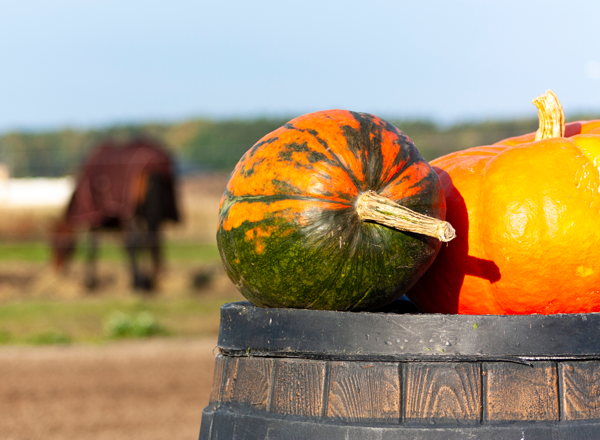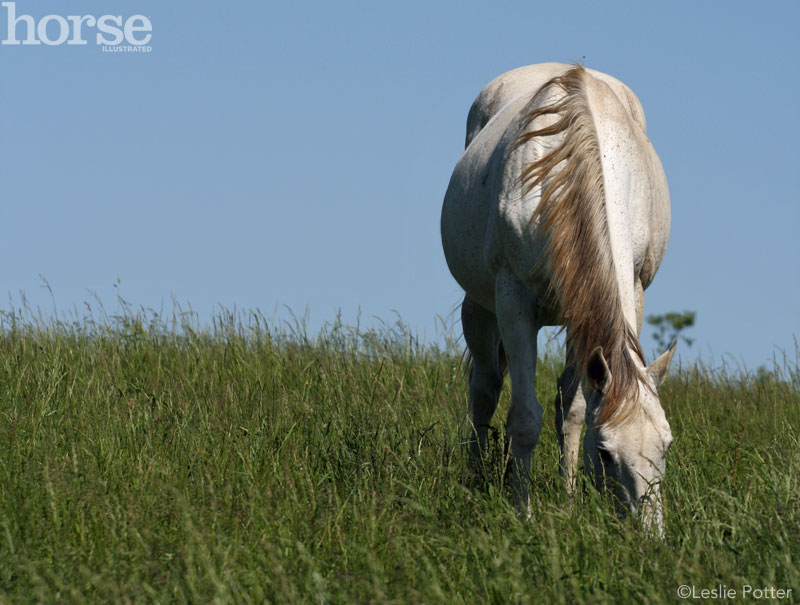Ever wish there was a way to calm your horse, help him heal or reduce his pain naturally? According to equine herbalists, and even some veterinarians, herbs provide effective aid for a variety of equine mental and physical issues. In fact, you’ve probably seen some common herbs in the supplement section of your local feed store. But what is the purpose, safety and effectiveness of these products, and how might they fit in with your horse’s health care program?
Hilary P. Self, a medical herbalist and director/co-founder of Hilton Herbs, based in Somerset, England, international purveyors of herbal- and plant-based products for equines and canines, explains that herbs and herbal products, when used correctly in horses, can help prevent or minimize the onset of certain disorders, treat various physical and behavioral conditions (both acute and chronic) and strengthen general health by giving the body the ability to heal itself. But Hilary says the way herbs are used and their role in equine health is often misunderstood.
Why Herbs?
|
There’s no doubt that pharmaceuticals offer powerful and effective treatments for a myriad of various short-term and chronic problems. But they are more effective for some problems than others and, depending on the particular drug, carry a risk of side effects—a special concern for long-term use. Consequently, many people seek an alternative or complementary therapy and traditional plant-based remedies—namely herbs, such as yucca, garlic, goldenrod, milk thistle and many others.
Herbal use for medical and veterinary applications is not new. For centuries, herb and plant materials were the basis for most human and veterinary medicines. Through the ages, the specific chemical agents in plants that produced the therapeutic effects were identified, isolated, extracted, and eventually, synthesized; today’s medicines are almost exclusively produced from chemical substances as opposed to natural plant sources. With their long history in medical tradition and relationship to their pharmaceutical cousins, herbal complements and alternatives make a lot of sense to some people.
“Herbs and herbal products have their indications and limitations,” states Allen M. Schoen, MS, DVM, director of the Veterinary Institute for Therapeutic Alternatives in Sherman, Ct. Dr. Schoen is a member of the Veterinary Botanical Medicine Association and lectures on herbal medicine at the School of Veterinary Medicine at Tufts University. He says herbal products have their place in equine prevention and treatment if there is some justification for use based on studies, traditional use or experiential evidence. “Their most appropriate use is when medications are not working or are having side effects, where surgery is not a reasonable option or where there is no appropriate conventional medical treatment. Sometimes, clients prefer to try herbs before trying a medication that may have significant side effects. However, herbal products should not be used when an appropriate medication or surgery is indicated.”
Prevention and Treatment
Hilary Self has been using herbs in equine preventative medicine and treatments for more than 20 years, working with and receiving referrals from a local veterinarian. She says, “The biggest problem is to make the owner understand that generally herbs, as a treatment, do not work in the same way or as quickly as conventional medicines. People have become so used to giving a pharmaceutical and seeing the symptoms disappear overnight that they can lose heart or patience with complementary therapies. What they forget is that the conditions manifested in their horses have often taken years to develop, therefore it’s unrealistic to expect them to be cured overnight.”
According to Hilary, herbal treatments not only help alleviate clinical signs, they
|
potentially relieve the root cause of the problem. “Herbal medicine looks at the whole horse,” Hilary says. “For example, with an arthritic horse, you would use herbs with anti-inflammatory and analgesic actions, such as devil’s claw, yucca, turmeric, willow, meadowsweet and yarrow; herbs to stimulate circulation and improve blood supply to the affected area; herbs to support the removal of inflammatory waste products from tissue; and herbs that encourage excretion of toxins from the body by supporting the liver and kidneys. Arthritic joints have a propensity to accumulate acidic inflammatory waste products in the area, so it’s beneficial if you can use herbs that will not only cleanse the affected tissues of the waste products but also then support the body in the removal of these products via the kidneys.”
When used in prevention, herbs should be given three to four weeks in advance of the “danger period” to allow the herbal properties to get into the body system, Hilary explains. “For example, a horse prone to seasonal allergies (allergic rhinitis, sweet itch, et cetera) should be administered the appropriate dried herbs well ahead of time. Another example is preparation for winter when a horse’s immunity may be lowered or there is an increased risk of viral infection. Obviously, prevention only works if you know of a pre-existing problem, but every physiological system of the horse can benefit from the prophylactic use of herbs.”
When You Use Herbs
Be informed and responsible when administering any product to your horse. First, make sure you know what condition you’re addressing via a proper veterinary diagnosis. “Once owners have a diagnosis, they are in a better position to choose which herbal product will be most suitable,” says Hilary.
Next, make sure your veterinarian knows about any herbs you intend to give your horse, especially if the horse is on other medications, and consult with an expert on which herbs to use. “Definitely, talk with either a veterinarian trained in herbal medicine or a trained herbal expert,” advises Dr. Schoen.
Just because herbs are natural doesn’t mean they are harmless. Misuse can cause harm. Follow label instructions and veterinary advice on usage, as overdosing could pose a risk to your horse. Don’t combine too many products, either. “Many owners seem to think using a ‘cocktail’ of supplements is a good idea,” Hilary says. “They mix a variety of herbal, homeopathic, aromatherapy and vitamin supplement products together, with no thought of the cumulative effect on the horse. I always liken this to a person taking a couple of Valium, plus some Prozac, and washing the whole lot down with a large gin and tonic!”
If you compete, check your show association’s list of banned substances before administering herbal products. Some herbs will “test” positive. Introduce the herbs gradually, as you would any new feed, and monitor for reactions. Adverse side effects are rare, but horses are individuals and can exhibit allergic reactions, Hilary warns. “Introduce the herbs slowly and build up to the full dosage over seven to 10 days. Generally, if the horse is going to exhibit any allergic reactions, they will tend to occur in the first 24 hours.”
Finally, be patient and give your herbs a chance to work. “It takes approximately three to four weeks for dried herbs to get into the system and start to have a beneficial effect,” Hilary points out, “and five to 10 days for herbal tinctures to be effective.”
With careful research on your part, herbal remedies can be another effective health aid for your horse.
Further Reading
An Herbal Sampler
Marcia King is an award-winning freelance writer specializing in animal health and welfare topics.
This article originally appeared in the May 2004 issue of Horse Illustrated. Click here to subscribe.





I believe herbs can cure but i have never heard of giving herbs to a horse i will start giving herbs to my beautiful sorrel mare heather
My 20 yr old mare has cushings.I tried chaste berry first. She wasn’t improving,but she wasn’t getting worse.My vet put her on pergolide.She is now worse.I’m putting her back on chaste berry and looking into other herbal remedies for her.
I think it is really cool that you can use herbs for healing!!!!!!!!
Herbal remedies are becoming more and more popular. Working for a company that specializes in these herbs, Herbsmith, we can see how herbal treatments can greatly benefit horses and work better than some pharmaceuticals. Herbs work to gradually build up to maximum effectiveness and when taken off, they sustain a much longer enjoyment than if you use pharamceuticals, where they experience a drop-off almost immediately if taken off them.
Mike is completely right about the pharmaceuticals.
At our barn, we use herbs only, and drugs as a last, LAST resort.
All our horses are completely healthy + happy.
(:
Herbal remedies were the primary basis for modern medicine and we’ve gotten away from these long standing herbal remedies due to our own impatience when it comes to them. They are not a quick fix, but they are effective when given at the proper theraputic dosages, or can just be used as a supplement to the horses regular diet. I think its great that more people are willing to take a look at natural medicine. I’ve been using it for years on myself and my own animals, and cant recall the last time I had to call a vet out. My horses are healthy, happy, barefoot and get NO grains or sweet feeds. They do get herbs, loose mineral salts and plenty of fiber. Our company simplynhn provides everything a horse would need and then some.
Thanks HI for telling people about herbs for horses! So many people out there think that ‘traditional’ medicine practices (drugs, surgery, vaccines, etc.) are the only, and best, method of keeping horses healthy/treating illness. But this isn’t always the case. My family has been using natural health methods for years for ourselves (I’ve never needed to go the the doctor’s office), and if I ever get my own horse, I would gladly use natural health methods to keep him/her healthy. Natural herbs, tinctures, etc. are actually way more safe and effective than many people realize, (when used properly), in some cases far more so than ‘traditional’ medicine.
Wonderful article. I’ve watched as natural health began to surface in human, feline, and canine fields but seemed to stay behind in the equine world. Thanks for being one of the first in bringing this to the forefront.
I am going to ask my horses vet if he uses herbal remedies.